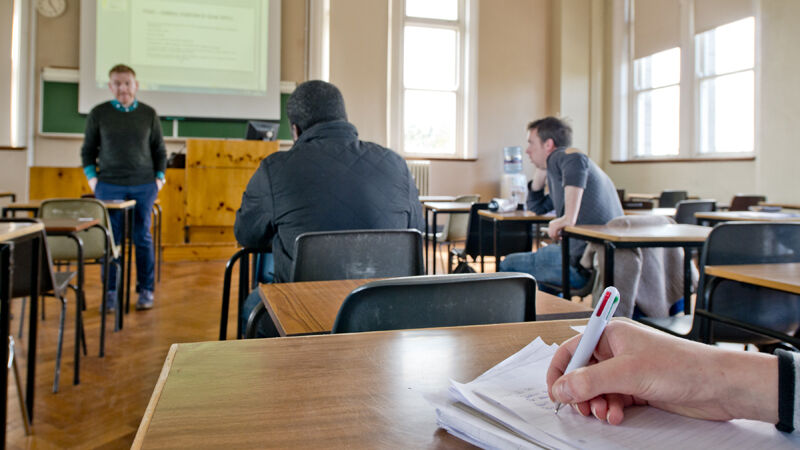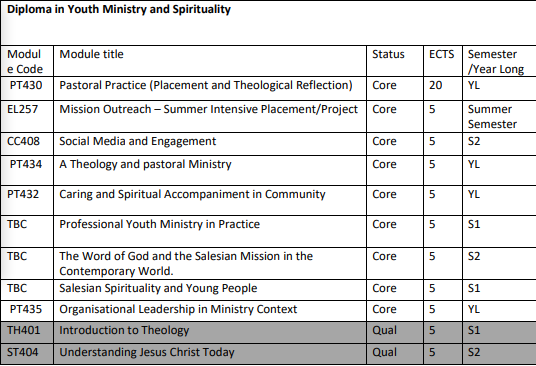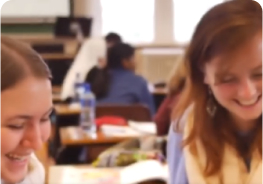Diploma in Youth Ministry and Spirituality
This programme in Youth Ministry and Spirituality is designed to be a pathway for someone with sufficient working experience in youth ministry but who does not have a previous degree in theology or youth ministry. Students attain a qualification in youth ministry while gaining conceptual and theoretical knowledge and developing practical and professional skills.

Professional Programmes - Full Time |
Full-time - 1 Year, Part-time - 2 Years |
| Fees and Funding | |
Application Deadline: |
30th August 2024
For EU & those living on the island of Ireland (Late applications may be considered). |
|
30th April 2024
For non EU |
|
Course Start Date: |
September 2024 |
| Get info | Apply now |
Introduction
This programme in Youth Ministry and Spirituality is designed to be a pathway for someone with sufficient working experience in youth ministry but who does not have a previous degree in theology or youth ministry. Students attain a qualification in youth ministry while gaining conceptual and theoretical knowledge and developing practical and professional skills.
Description
The programme is also designed for students or graduates of primary degrees in theology who intend to engage in further studies (e.g. Masters in Youth Ministry) but need a preparatory Diploma to have the right methodological and pastoral qualification to engage in research in youth ministry at a post graduate level.
The programme commences in September 2024 with the registration and recruitment of new students (with individual and group interviews) concluded during the academic year 2023 in line with the normal college admissions guidelines and dates.
Aims of the course
This course will help to respond to the urgent needs of pastoral mission and care for young people in Ireland, especially in Catholic parishes throughout the country. It will be an introductory programme for those who wish to develop their pastoral knowledge and skills for ministry with children, teenagers and young adults, while gaining a professional qualification. The programme is designed to provide practical experience, theological learning, and spiritual development. Students are given an opportunity to minister in pastoral contexts both in Ireland and internationally.
Learning will happen through course work, participation in seminars, human development, exploration of the student’s own personal faith journey, and placement education. Students form an ability to integrate their learning from academic study and placement experiences accompanying young people in different pastoral situations, in diverse settings, including school, parish, and youth centres (clubs and projects).
The study of the fundamental pedagogical concepts and theories will be enhanced by the practical approach so that students are able to immediately put their learning outcomes into practice. It is expected that the course will be a life-changing experience. It will nourish participants’ engagement in learning whilst promoting learner autonomy and life-long learning.
Students will engage in educational practice through the placement and will have opportunities to specialise in aspects of practice. As such the programme will:
AIM 1: Provides a professional qualification for Youth Pastoral Ministers (YPM) offering a grounding in Catholic Faith Education and placement education experience in youth-care, so that graduates can accompany and empower young people in the present generation and global culture.
AIM 2: Provide a programme which approach is based on practical Christian humanism and a philosophical anthropology that is focused on empowering the young to face the different challenges of life.
AIM 3: The course will prepare YPMs with a spiritual background that includes personal accompaniment and supervision of young people using the ‘Preventive System’ of Education that seeks to bring out the good in the young while preventing (safeguarding) against harm.
AIM 4: Support engagement with pedagogic issues in specific disciplines through curriculum design and assessment so that students can demonstrate a deep and systematic understanding of current approaches to Youth Ministry.
AIM 5: Provide opportunities to engage in practice promoting external recognition of the field and strengthening the professional community locally and internationally.
AIM 6: Provide support and enhancement of the professional skills with a strong focus on Youth Ministry and application of complex and specialised knowledge to the field of Pastoral Theology.
Career Outcomes
This course will help to respond to the urgent needs of pastoral mission and care for young people in Ireland, especially in Catholic parishes throughout the country. It will be an introductory programme for those who wish to develop their pastoral knowledge and skills for ministry with children, teenagers and young adults, while gaining a professional qualification. The programme is designed to provide practical experience, theological learning, and spiritual development. Students are given an opportunity to minister in pastoral contexts both in Ireland and internationally.
Course Structure
Course structure
This section shows the modules available as part of the Diploma in Youth Ministry and Spirituality and its credit value. Both part-time and full time students study 60 credits over one/two years (2/4 semesters). The Placement may take place in summer time after the modules are complete. The course may be offered in both modes. The full time mode is an attractive option for international students or those students taking a sabbatical. The structure for these students is constructed based on the module choice and under close supervision of the Programme Director. The course structure is validated by St Patrick’s Pontifical University every 5 years, but it can change by adapting to feedback from a variety of sources.
Core modules that must be taken and passed by all students on the course, irrespective of their pathway

Award Diploma in Youth Ministry and Spirituality available.
Please note: Should optional modules be available they will not necessarily be offered in any one year. In addition, timetabling and limited spaces may mean a student cannot do their first choice of modules.
Learning Outcomes
Learning outcomes are statements on what successful students have achieved as the result of learning. These threshold statements of achievement are linked to the knowledge, understanding and skills that a student will have gained on successfully completing a course. On completion of the course the successful student will be able to:
Knowledge and understanding (KU), Cognitive Skills (CS), Personal and Ministry skills (PM) and Key Transferrable Skills (KTS)
Knowledge and Understanding
1. Identify and apply basic methods in biblical studies and Christian theology.
2. Describe and discuss attitudes, skills, and abilities required for youth ministry.
3. Analyse and reflect critically on the attitudes, skills and abilities required for Youth Ministry.
4. Critically and systematically analyse a range of issues in Pastoral ministry
5. Engage self-reflectively and critically in developing an analysis of the attitudes, skills and abilities required for Youth Ministry
6. Engage in critical self-reflection on learning developed throughout the programme and its application for personal ministry practice within the area of Youth Ministry.
7. Complete a Portfolio that makes use of scholarly resources; devise and sustain theological arguments and examines critically an issue related to Youth Ministry
Cognitive Skills
1. Identify and apply basic methods for interpreting and communicating the biblical text
2. Demonstrate awareness of different Christian traditions and be able to represent diverse views fairly and accurately
3. Reflect critically on particular demands of Youth Ministry in a variety of contexts.
4. Analyse and apply critically methods for interpreting and communicating the biblical text in a variety of settings
5. Engage actively with and evaluate a range of perspectives and be able to represent different views fairly and accurately
6. Identify, analyse and evaluate the particular demands of Youth Ministry in a variety of contexts.
7. Understand and apply best practice, relegation and statutory requirements in relation to safeguarding in ministry
Personal and Ministry skills
1. Develop skills of independent study and self-reflective learning
2. Begin to develop skills of critical thinking and self-critical analysis
3. Reflect self-critically on the interface between theory and Youth Ministry practice
Key Transferable Skills
1. Exercise personal responsibility in developing a pattern of independent learning
2. Develop relationships that foster teamwork and mutual partnerships
3. Understand the process of analysis and critical thinking
4. Utilise library and online theological learning resources to gather secondary source material.
5. Communicate with nuanced arguments that engage with issues of academic debate
6. Identify and reflect critically on areas of personal interest for independent research
7. Reflect critically on teamwork and mutual partnerships
8. Engage in analysis and critical thinking and self-critical reflection
9. Become an increasingly self-reflective learner;
10. Apply learning in the context of ministry practice.
Learning and teaching
The learning and teaching process builds on participants’ current practice that will be discussed and reflected upon to maximise personal development and to share learning across diverse domains. The course draws extensively on models of critical reflection as a means of interrogating and theorising practice. This may take the form of learning through inquiry into individual practice, research, reflection, collaborative learning, and the modelling of the student experience as a vehicle for reflection. There will be opportunities for peer- and tutorobservations. Blended learning tasks will be employed to provide participants and to diversify learning experiences. Teaching on the course will be in the form of mentoring, coaching and facilitation through reflective practice and placements with structured independent learning.
The learning is seen as partnership between the student, their peers and a teaching team. It is a mix of timetabled activities and student’s own personal study. ‘Scheduled Contact/Activity Time’ (i.e. ‘Contact Hours’) involves interaction with, or supervision from, teaching and associated staff and the activities they set up for students to help shape and guide students’ studies. This is where students may be introduced to new ideas and knowledge; shown practical skills to practice independently; offered guidance on project work; or given personalised feedback. It may be face-to-face or mediated through other channels such as the Intranet.
The course places a strong emphasis on participative learning. At a personal level, the course addresses the integration of academic and practice-based learning, with a focus on growth in self-understanding as well as personal, relational, and spiritual development.
Course work includes group sessions, lectures, presentations, and interactive seminars. While classes are normally on Thursday and Friday of each week, students may be required to attend classes and seminars that are only available outside these times.
Students commit to a placement education experience during the programme.
One Year, Full-Time students: Placement usually takes place between Sunday and Wednesday of each week, for an average of 10-12 hours of contact time per week, with classes in Maynooth on Thursday and Friday. Students will also be required to participate in a number of block placements in their placement sites, with an extended contact time of 16-18 hours per week.
Two Year, Part-Time students: Placement usually takes place between Sunday and Wednesday of each week in the two academic years, for an average of 5-6 hours of contact time per week, with classes in Maynooth on Thursday (in Year One) and on Friday (in Year Two). Students will also be required to participate in a number of block placements in their placement sites, with an extended contact time of 8-9 hours per week.
Placement education sites are arranged in collaboration with the Programme Director and the Pastoral Practice Module Coordinator. The Pastoral Practice module includes the following: mentoring support with an on-site Placement Contact Person, or his/her Designated Alternate; ongoing one-to-one mentoring or Pastoral Supervision; two visits by an assigned Placement Supervisor; participation in weekly small-group, peer-support, theological reflection sessions; and, an end-of-year integration day. The placement education experience is a central context for learning and growth, and is fundamental for the overall pastoral formation of the students.
Placement is a distinctive feature of teaching and learning on this course. It refers to linking students’ university experiences to their placement in the field. It aims to combine academic learning with authentic practice through a set of scheduled activities that are organized either in advance of or as a follow up of the contact session such as:
- Tutor, peer or group observations on a fortnight basis
- Individual or joint hands-on tasks or inquiry projects in the classroom
- Micro teaching
- Co-teaching
Some placement activities will be compulsory, whereas others are a voluntary part of a course. They will all contribute to the achievement of the learning outcomes. The key strength of the Diploma is that it allows students to apply what they learn at university to a real work situation with the purpose to enhance personal professional practice immediately. Note that for the students on the full-time learning mode, the university will provide opportunities for placement. This process will be coordinated by the Programme Coordinator.
Alongside the scheduled studies, ‘independent’ study is very important. This is the time that students learn without direct supervision from, or contact with, a member of staff and this makes up a large part of the studies. It is likely to include background reading, preparation for lectures or tutorials, follow-up work, wider practice, the completion of assignments, revision and so on. Some independent study may be structured for students as a key part of the learning, but it also is an additional study to undertake to further improve learning. To summarise, very broadly study activity will break down into:
- Scheduled contact/activity time (lectures, seminars, tutorials, supervisions and otherdirected activities);
- Structured independent study, such as preparing for scheduled learning activity;
- Case studies that are frequently used to provide context for, and to demonstrate the application of theory;
- Placement/practical classes;
- Group/team work as a Class Preparation Assignment;
- Other methods may involve student presentations or student-led seminars, and a form of “clinic" where students can raise any problems related to the module.
Teaching methods include: group sessions, lectures, presentations, and interactive seminars.
While classes are normally on Thursday and Friday of each week, students may be required to attend classes and seminars that are only available outside these times. For part-time students, classes in Maynooth on Thursday (in Year One) and on Friday (in Year Two).
Application Requirements
Admissions requirements
Entry requirements for the Higher Diploma in Youth Ministry and Spirituality (Code - MU ) have been set in order to select potential students who have the proven academic ability to undertake a Level 8 Higher Diploma course.
The admissions policy aims to attract and recruit motivated applicants across the full range of possible access routes. Students may have a background in any academic discipline. The overriding principle upon which admission decisions are based is that applicants should be likely to benefit from and succeed on the course.
Minimum entry requirements for the course
Formal Education
Applicants are required to have a recognised degree qualification where theology is at least a minor component.
Applicants with other degrees may be considered if they have relevant experience in pastoral ministry to young people. They will be required to take courses in theology to qualify for admission to the programme. Evidence of such employment, its nature and level will be required. This will be considered in the interview process and the decision of the panel (see below) will be final.
English language requirement
Applicants must have:
- Had their secondary education taught and assessed in English; or
- An IELTS score of 6 with a minimum of 5.5 in the writing component or another English Language Test recognised by St Patrick’s Pontifical University.
Applicants whose first language is not English will be required to satisfy the English language requirement.
Interview
Applicants who have met the minimum entry requirements will be formally interviewed. The purpose of the interview is to determine the suitability of the candidate to undertake and complete the course. The panel will also consider any equivalent or non-standard admission qualifications. In so doing, the panel may require additional evidence from the candidate to support the candidate’s request for consideration for equivalency, such as the nature and level of the work experience.
Note: even if an applicant meets our minimum admission requirements, the University cannot guarantee a place on the course.
Recognition of Prior Learning
Applicants with prior certificated or experiential learning at the same level of the qualification for which they wish to apply are advised to contact the admissions team.
PLEASE NOTE: Application forms must be completed in full, and all documentation must be provided BEFORE an application can be considered. Applicants will not be called for interview if an application is incomplete.
For further information contact;
Admission Office,
St Patrick’s Pontifical University,
Maynooth,
County Kildare
Tel: 01 708 4772
Fax: 01 708 3477
Email: cmmadmissions@spcm.ie
Web Page: www.sppu.ie

If you live outside Ireland, check out our dedicated area for international students.
Let’s talk
For Undergraduate queries: email admissions@spcm.ie.
For Postgraduate queries: email pgadmissions@spcm.ie.
For The Centre for Mission & Ministries queries, email: cmmadmissions@spcm.ie.
